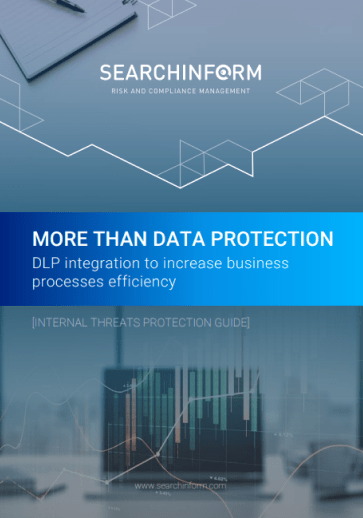Definition and Importance
of Data Subject Rights
- Rights of Data Subjects
- Right to Access
- Right to Rectification
- Right to Erasure (Right to be Forgotten)
- Right to Data Portability
- Right to Object
- Rights Related to Automated Decision-Making and Profiling
- Right to Restriction of Processing
- Right to Object to Direct Marketing
- Right to Withdraw Consent
- Compliance and Implementation
- Navigating Challenges in Data Subject Rights Compliance
- Emerging Trends in Data Protection and Privacy
- Maximizing Data Subject Rights With SearchInform Solutions
Data Subject Rights refer to the rights granted to individuals (data subjects) regarding their personal data, as defined by data protection laws and regulations. These rights empower individuals to have control over their personal information, ensuring transparency, fairness, and accountability in data processing activities.
Data Subject Rights are crucial for several reasons:
- Privacy Protection: They safeguard individuals' privacy by giving them control over how their personal data is collected, processed, and used.
- Empowerment: Data Subject Rights empower individuals to make informed choices about their personal data, promoting autonomy and self-determination.
- Trust and Confidence: Upholding these rights fosters trust between individuals and organizations handling their data, enhancing confidence in data processing practices.
- Accountability: By holding organizations accountable for their data processing activities, Data Subject Rights encourage responsible data management and ethical conduct.
- Legal Compliance: Adhering to Data Subject Rights ensures compliance with data protection laws and regulations, avoiding legal consequences such as fines and penalties for non-compliance.
Key Regulations and Frameworks
Regulations and frameworks play a pivotal role in shaping the landscape of data protection and privacy, establishing a comprehensive framework of rights, obligations, and standards to govern the collection, use, and safeguarding of personal information. Below are several examples of them:
General Data Protection Regulation (GDPR):
Enforced by the European Union (EU), the GDPR is a comprehensive data protection regulation aimed at safeguarding the personal data of individuals within the EU. It sets out stringent requirements for organizations handling personal data, including provisions for transparency, accountability, and individual rights. The GDPR applies extraterritorially, meaning it affects any organization processing personal data of EU residents, regardless of the organization's location.
California Consumer Privacy Act (CCPA):
The CCPA is a landmark privacy law in California, United States, designed to enhance consumer privacy rights and regulate the collection and use of personal information by businesses operating in California. It grants California residents rights such as the right to access, delete, and opt-out of the sale of their personal information. The CCPA imposes obligations on covered businesses to disclose data practices and provide mechanisms for consumers to exercise their rights.
Personal Data Protection Act (PDPA) (Singapore):
Singapore's PDPA governs the collection, use, and disclosure of personal data by organizations in Singapore. It aims to protect individuals' personal data while facilitating the legitimate use of data for business purposes. The PDPA establishes rules for consent, data protection obligations, data access and correction rights, and the handling of complaints and breaches.
Lei Geral de Proteção de Dados (LGPD) (Brazil):
Modeled after the GDPR, Brazil's LGPD is a comprehensive data protection law that regulates the processing of personal data in Brazil. It aims to protect individuals' privacy rights and promote the responsible use of personal data by organizations. The LGPD establishes principles for data processing, individuals' rights, data controllers' obligations, and sanctions for non-compliance.
Health Insurance Portability and Accountability Act (HIPAA) (United States):
HIPAA is a federal law in the United States that sets standards for the protection of sensitive patient health information (PHI). It applies to healthcare providers, health plans, and healthcare clearinghouses, as well as their business associates who handle PHI. HIPAA safeguards individuals' privacy by regulating the use, disclosure, and security of PHI and imposes penalties for violations.
Personal Information Protection and Electronic Documents Act (PIPEDA) (Canada):
Canada's PIPEDA is a federal privacy law governing the collection, use, and disclosure of personal information by private-sector organizations in Canada. It aims to balance individuals' privacy rights with organizational interests by establishing principles for the fair and lawful handling of personal information. PIPEDA applies to commercial activities across Canada, except in provinces with substantially similar legislation.
and perform with SearchInform DLP:
Rights of Data Subjects
The rights of data subjects refer to the fundamental entitlements granted to individuals concerning their personal data under various data protection laws and regulations. Some of the key rights typically granted to data subjects include:
Right to Access
The right to access empowers data subjects to inquire whether organizations are processing their personal data and, if so, to obtain a copy of that data along with details regarding its usage. This includes information about the purposes of processing, the categories of personal data involved, the recipients or categories of recipients to whom the data has been disclosed, and the envisaged retention period. By exercising this right, individuals gain transparency into how their data is being handled by organizations, facilitating informed decision-making and enabling them to ensure the accuracy and lawfulness of their personal data processing.
Right to Rectification
The right to rectification grants individuals the authority to request the correction of any inaccuracies or incompleteness in their personal data held by organizations. This ensures that data subjects have control over the accuracy and integrity of their personal information, thereby minimizing the risk of erroneous decisions or adverse consequences resulting from incorrect data. By rectifying inaccuracies or omissions promptly, organizations demonstrate their commitment to maintaining data accuracy and fulfilling their obligations to data subjects.
Right to Erasure (Right to be Forgotten)
The right to erasure, commonly known as the right to be forgotten, enables data subjects to request the deletion or removal of their personal data under specific circumstances. This right empowers individuals to exercise control over their online presence and protects their privacy by allowing them to remove outdated, irrelevant, or unlawfully processed personal data from organizations' databases. However, organizations must balance this right with other legal obligations, such as the preservation of data for compliance purposes or the exercise of freedom of expression and information.
Right to Data Portability
The right to data portability grants individuals the ability to receive a copy of their personal data in a structured, commonly used, and machine-readable format, as well as to transmit this data to another data controller without hindrance. This facilitates data mobility and interoperability between different services and platforms, empowering individuals to switch providers or platforms easily while retaining control over their personal information. By promoting data interoperability and facilitating competition and innovation, the right to data portability enhances consumer choice and fosters a more dynamic and user-centric data ecosystem.
Right to Object
The right to object empowers data subjects to challenge the processing of their personal data in certain situations, such as for direct marketing purposes or where the processing is based on legitimate interests or the performance of tasks carried out in the public interest. This right provides individuals with a mechanism to assert their preferences and interests regarding the use of their personal data, thereby safeguarding their privacy and autonomy. Organizations must respect data subjects' objections unless they can demonstrate compelling legitimate grounds for the processing that override the interests, rights, and freedoms of the data subject or for the establishment, exercise, or defense of legal claims.
Rights Related to Automated Decision-Making and Profiling
Data subjects have the right not to be subject to solely automated decisions, including profiling, that produce legal effects or significantly affect them, unless certain exceptions apply. This right safeguards individuals against the potential risks of automated decision-making processes, such as algorithmic bias, lack of transparency, and loss of human oversight. It ensures that individuals retain meaningful control over decisions that impact them and have the opportunity to contest or seek human intervention in automated decision-making processes.
Right to Restriction of Processing
The right to restriction of processing allows individuals to request the limitation of the processing of their personal data in certain circumstances. This includes situations where the accuracy of the personal data is contested, the processing is unlawful, or the data is no longer needed for the original purposes but is required for legal claims. By exercising this right, data subjects can temporarily halt or restrict the processing of their personal data while disputes are resolved or investigations are conducted, thereby preserving the status quo and protecting their interests.
Right to Object to Direct Marketing
Data subjects have the right to object to the processing of their personal data for direct marketing purposes, including profiling related to such marketing. This right empowers individuals to control the use of their personal information for marketing communications and ensures that organizations respect their preferences and privacy choices. Upon receiving an objection, organizations must cease processing the individual's personal data for direct marketing purposes promptly.
Right to Withdraw Consent
Where processing is based on consent, data subjects have the right to withdraw their consent at any time, without affecting the lawfulness of processing based on consent before its withdrawal. This right underscores the principle of autonomy and control over personal data, allowing individuals to revoke their consent if they no longer wish to permit the processing of their data. Organizations must make it as easy for individuals to withdraw consent as it was to give it, and they must inform individuals of this right before obtaining consent. Withdrawal of consent should be straightforward and accessible, with no detriment to the data subject for exercising this right.
Compliance and Implementation
Compliance and implementation of data subject rights are crucial aspects of ensuring that organizations meet their obligations under data protection laws and regulations. Here's an overview of how compliance and implementation are typically approached:
Understanding Legal Requirements: Organizations must first understand the legal requirements pertaining to data subject rights under applicable data protection laws such as the GDPR, CCPA, PDPA, LGPD, HIPAA, and PIPEDA. This involves conducting a thorough review of the relevant regulations to identify the specific rights granted to data subjects and the corresponding obligations imposed on organizations.
Policy Development: Based on the identified legal requirements, organizations develop internal policies and procedures to ensure compliance with data subject rights. These policies outline the steps to be taken when handling data subject requests, such as requests for access, rectification, erasure, or data portability. They also establish mechanisms for obtaining and managing consent, handling data breaches, and addressing complaints related to data processing activities.
Data Mapping and Inventory: Organizations conduct data mapping exercises to identify the types of personal data they collect, process, and store, as well as the purposes for which it is used and the legal basis for processing. This helps organizations understand the scope of their data processing activities and facilitates compliance with data subject rights, such as the right to access and the right to erasure.
Data Protection Impact Assessments (DPIAs): Organizations may conduct DPIAs to assess the potential risks and impact of their data processing activities on data subjects' rights and freedoms. DPIAs help organizations identify and mitigate privacy risks, ensuring that data processing activities are conducted in a manner that complies with legal requirements and respects data subject rights.
from different sources:
Data Subject Requests Handling: Organizations establish processes and procedures for handling data subject requests in a timely and efficient manner. This includes establishing channels through which data subjects can submit their requests, verifying the identity of data subjects to prevent unauthorized access to personal data, and responding to requests within the timelines specified by law (e.g., within 30 days under the GDPR).
Technical and Organizational Measures: Organizations implement technical and organizational measures to ensure the security and confidentiality of personal data and to prevent unauthorized access, disclosure, alteration, or destruction. This may involve implementing encryption, access controls, pseudonymization, and data minimization techniques, as well as conducting regular security assessments and audits.
Training and Awareness: Organizations provide training and awareness programs to employees who handle personal data to ensure they understand their responsibilities and obligations regarding data subject rights and data protection laws. Training programs cover topics such as data privacy principles, handling data subject requests, data security best practices, and reporting data breaches.
Documentation and Record-keeping: Organizations maintain detailed records of their data processing activities, including data subject requests received and actions taken in response to those requests. Documentation helps demonstrate compliance with data protection laws and regulations and provides evidence of accountability in the event of regulatory inquiries or investigations.
Continuous Monitoring and Review: Compliance with data subject rights is an ongoing process that requires continuous monitoring and review of data processing activities. Organizations regularly assess their compliance status, identify areas for improvement, and update policies and procedures as necessary to ensure continued adherence to legal requirements and best practices.
By implementing robust compliance measures and effectively managing data subject rights, organizations can build trust with their customers, mitigate legal and reputational risks, and demonstrate their commitment to protecting individuals' privacy and personal data.
Navigating Challenges in Data Subject Rights Compliance
Data security remains a formidable challenge in safeguarding personal information against evolving cyber threats and data breaches, necessitating continuous investment in robust security measures to prevent unauthorized access and cyberattacks.
Regulatory compliance, particularly with stringent data protection laws like the GDPR and CCPA, presents complexities for organizations, demanding resources and expertise to navigate intricate requirements such as data subject rights and consent management. Establishing effective data governance frameworks is vital for managing data throughout its lifecycle, yet organizations face hurdles in defining ownership, roles, and policies while ensuring compliance and accountability. Cultivating a culture of data privacy and security poses challenges in promoting employee awareness, training, and accountability, particularly in large or decentralized organizations.
Moreover, rapid advancements in technologies like AI, ML, and IoT introduce complexities in addressing ethical concerns, algorithmic bias, and ensuring transparency in automated decision-making processes, adding further layers of complexity to data protection and privacy efforts.
Emerging Trends in Data Protection and Privacy
Emerging trends in data protection and privacy include the adoption of privacy by design and default principles, emphasizing the integration of privacy measures into product development to ensure privacy and data protection from the outset.
Additionally, there's a rising trend towards data localization driven by regulatory requirements and concerns over data sovereignty, although this may introduce complexities for multinational organizations. Enhanced consent management solutions are also gaining attention, focusing on obtaining explicit consent and providing easy withdrawal options for individuals. Privacy-enhancing technologies like encryption and anonymization are increasingly utilized to protect personal data while enabling legitimate use.
Moreover, organizations are prioritizing data ethics and trustworthiness, emphasizing transparency and responsible data stewardship. Lastly, managing cross-border data transfers poses challenges due to differing regulations, driving the development of international data transfer mechanisms for lawful and secure data exchange.
Maximizing Data Subject Rights With SearchInform Solutions
SearchInform Solutions offer a comprehensive suite of tools and functionalities designed to streamline compliance, enhance data management, and fortify security measures, thereby empowering organizations to navigate the complexities of data protection regulations with confidence and efficiency. Some of them are:
Comprehensive Compliance: SearchInform Solutions offer robust tools for ensuring compliance with data protection regulations such as GDPR, CCPA, and others, facilitating adherence to data subject rights requirements seamlessly.
Efficient Data Management: With advanced data management capabilities, SearchInform Solutions enable organizations to efficiently handle data subject requests, including access, rectification, erasure, and portability, ensuring swift and accurate responses.
Enhanced Security Measures: SearchInform Solutions incorporate state-of-the-art security features to safeguard personal data, mitigating risks of unauthorized access, leakages, and data misuse, thereby enhancing data subject privacy and trust.
Streamlined Consent Management: The solutions provide streamlined consent management functionalities, allowing organizations to obtain, track, and manage consent effectively, ensuring compliance with consent-related requirements and preferences of data subjects.
Automated Processes: SearchInform Solutions automate various data subject rights processes, reducing manual efforts and ensuring consistency and efficiency in handling requests, thereby optimizing resource utilization and improving organizational productivity.
Comprehensive Reporting and Auditing: With robust reporting and auditing capabilities, the solutions offer insights into data subject rights-related activities, facilitating transparency, accountability, and regulatory compliance for organizations.
Scalability and Flexibility: SearchInform Solutions are scalable and adaptable to the evolving needs of organizations, catering to businesses of all sizes and industries, and enabling seamless integration with existing IT infrastructure.
Continuous Compliance Updates: The solutions provide timely updates and enhancements to align with evolving data protection regulations, ensuring organizations stay compliant with changing requirements and maintain data subject rights effectively.
Elevate your commitment to data subject rights and privacy while optimizing organizational productivity and trust. Schedule a demo or contact us to learn more about how SearchInform Solutions can revolutionize your approach to data protection and compliance!
Full-featured software with no restrictions
on users or functionality
Company news
SearchInform uses four types of cookies as described below. You can decide which categories of cookies you wish to accept to improve your experience on our website. To learn more about the cookies we use on our site, please read our Cookie Policy.
Necessary Cookies
Always active. These cookies are essential to our website working effectively.
Cookies does not collect personal information. You can disable the cookie files
record
on the Internet Settings tab in your browser.
Functional Cookies
These cookies allow SearchInform to provide enhanced functionality and personalization, such as remembering the language you choose to interact with the website.
Performance Cookies
These cookies enable SearchInform to understand what information is the most valuable to you, so we can improve our services and website.
Third-party Cookies
These cookies are created by other resources to allow our website to embed content from other websites, for example, images, ads, and text.
Please enable Functional Cookies
You have disabled the Functional Cookies.
To complete the form and get in touch with us, you need to enable Functional Cookies.
Otherwise the form cannot be sent to us.

Subscribe to our newsletter and receive a bright and useful tutorial Explaining Information Security in 4 steps!

Subscribe to our newsletter and receive case studies in comics!








